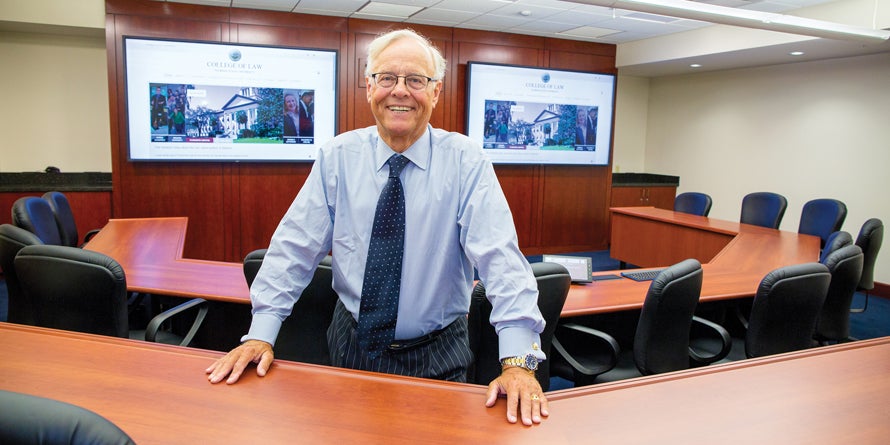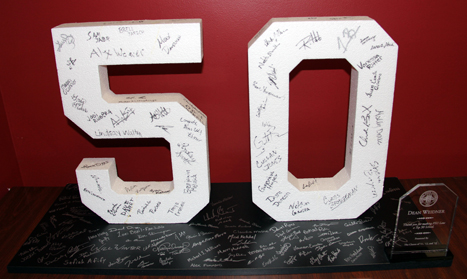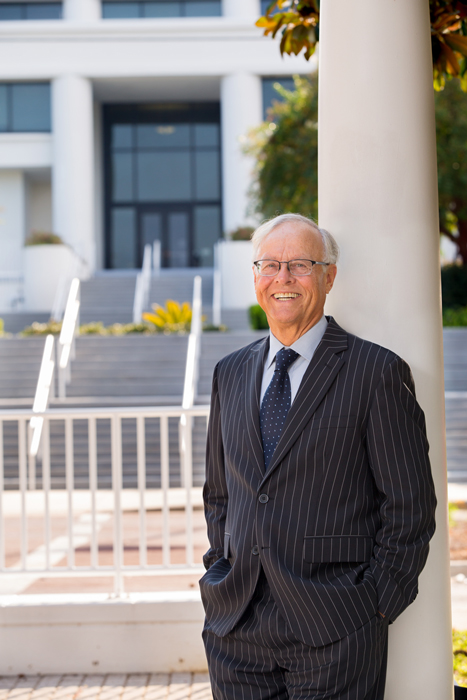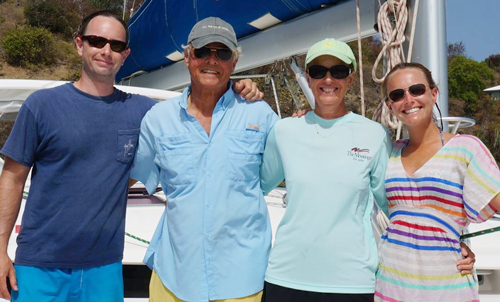Dean Don Weidner

Friend, Colleague, Innovator, Leader and Cheerleader-in-Chief
When Dean Don Weidner steps down as dean in June 2016, it will be the end of a wildly successful era. It is almost impossible to succinctly state everything that he has accomplished since becoming dean in 1991. Recognized in 2011 as one of the most transformative law school deans of the past decade, perhaps Weidner’s most obvious accomplishment is leading the Florida State University College of Law into the top tier of American law schools.
“I am, of course, pleased that we’ve moved into the top tier,” said Weidner. “And I was deliriously happy when last year we, for the first time, beat University of Florida in the U.S. News rankings.”
Weidner’s countless other accomplishments have propelled Florida State to be ranked among the nation’s best law schools.
“Don has led the College of Law to remarkable heights in every meaningful way: faculty scholarship and teaching, student body profile, placement of graduates, alumni involvement and contributions, and national standing,” said John W. & Ashley E. Frost Professor Nat S. Stern, who considered Weidner his mentor and close friend well before Weidner became dean. “Even the physical facilities have undergone dramatic improvement and expansion under Don. His unflagging dedication and superb leadership have enabled the law school to make those strides.”
“Part of Don’s greatness as a leader is that he would never take credit for all of these successes,” said First District Court of Appeal Judge Stephanie W. Ray (’95), who is an alum and who also worked with Weidner at the law school for many years. “He’s masterful at assembling resources, sharpening ideas, and inspiring others. But we all know where the credit lies.”
Under his leadership, the law school’s annual giving rate has increased by approximately 500 percent – FSU has the nation’s 10th best alumni giving rate – and its endowment has grown to more than six times what is was.
“People who only know Don by reputation will think of him as a con summate fundraiser, and they’d be right. But they would never guess that he didn’t come to it naturally,” said alum Wayne Hogan (’72), president at Terrell Hogan and Summer for Undergraduates Program benefactor. “He knew partnership law like nobody else, but he didn’t know fundraising. He had to train himself into it. He worked hard at it. And, before we knew it, he was transformed into our version of Bobby Bowden in the family kitchen.”
Utilizing the funds he helped raise, Weidner created a system of merit that brought top scholars to Florida State and has kept them in Tallahassee when higher ranked law schools tried to recruit them.
“Putting merit into the salary determinations for both faculty and staff is really important. At the faculty level, we had two chairs when I started and no endowed professorships,” recalled Weidner. “And we now have 21 endowed professorships and they are awarded purely on the basis of merit. We do it a little bit differently than most schools – we appoint people to professorships for five-year terms with renewal contingent on the recipient’s continued scholarly productivity. Also, we’ve been very aggressive in our counter-offer policy. Thanks to alumni who have endowed the professorships, we’ve been able to retain many of our best faculty against all but the most heavily endowed private and public law schools.”

giant, Styrofoam ‘50’ that they signed when Florida State broke into the U.S. News & World
Report top 50 law schools.
Stearns Weaver Miller Professor Mary Ziegler appreciates Weidner’s enthusiastic leadership of the faculty. “Don goes out of his way to make me feel supported in both tangible and intangible ways. He has steadfastly supported my research and given me every opportunity to pursue important projects and present my research to national audiences. More than many deans, he deeply values good teaching and exchanges ideas with faculty about how each of us can improve in the classroom. He celebrates faculty achievements and makes each of us feel that he is proud of what we have done. It is hard to imagine a dean making faculty feel more valued.”
“At one point we had a faculty that did not get along with each other very well, but that is no longer the case at all,” said Professor Emeritus Chuck Ehrhardt, who has been on the faculty since before Weidner became an FSU professor in 1976. “The ship is running smoothly. Students and faculty are very happy with his leadership. I think he is going to be a very difficult person to replace.”
Always an innovator, Weidner continually adapted and expanded the school’s academic offerings in response to changes in the legal marketplace.
“The curriculum is much stronger than it’s ever been,” said Weidner. “On the litigation side we have new courses such as Depositions and Jury Selection. And on the business side we have a Business Law Clinic and courses on the Dodd-Frank Act and Game Theory for Business Lawyers. We’re in a position to be institutionally nimble with our new 3+3 programs, expanded LL.M. programs and our new Juris Master program. And we’ve been pushing the cutting-edge, but not the bleeding-edge, of technology by using various distance learning technologies, including asynchronous technologies.”
Weidner embraces technology and in recent years has sought to bring state-of-the-art software and equipment into all of the law school’s classrooms. Earlier in his tenure, Weidner addressed a need for more clinical offerings.
“We now have live-client clinics in addition to externships and the externship program is much more organized and has expanded greatly,” said Ruth Stone, who is the Wayne and Pat Hogan Professor of Trial Practice and leads the Family Law Clinic. “Don seems to understand that you need both theory and practice to turn out good lawyers and he has embraced the clinics. He has always been open to suggestions and ideas that are novel.”
During the last decade, Weidner garnered support for a facilities expansion that resulted in the school’s 50,000-square-foot Advocacy Center. The building includes five courtrooms – four with jury boxes and one with a jury deliberation room. It is part of Weidner’s larger vision to have an immaculate, sophisticated physical plant in which students can prepare for their careers.
 “This new Advocacy Center building has taken our physical plant to a whole new level,” said Weidner. “We couldn’t have done it without the alumni who helped us behind the scenes to champion our cause with the Legislature.”
“This new Advocacy Center building has taken our physical plant to a whole new level,” said Weidner. “We couldn’t have done it without the alumni who helped us behind the scenes to champion our cause with the Legislature.”
Throughout his tenure as dean, Weidner has fostered a collegial community where students come first. Like a proud father, he is the first to spread the word about a national award or advocacy victory. While most U.S. law deans do not teach regularly, Weidner enjoys interacting with students so much that he has continued to teach a class every year while he has been dean.
Alum Peggy Rolando (’78) took Real Estate Finance and Business Associations from Weidner before he became dean. Now a partner in the Miami office of Shutts & Bowen and a national expert in condominium and real estate finance, Rolando uses daily the concepts she learned in Weidner’s classes. More importantly, she has been friends with Weidner since she graduated.
“What I find remarkable about Don is his abiding interest in his students and in the alums,” said Rolando. “He is so good at reaching out and talking to people – finding out what their practices are like, what they’re interested in. He has this effortless interest. Not so long after I graduated he would give me a call, maybe once or twice a year, just to touch base and see how I was doing. And this was long before he was dean. He was staying in contact to see what his students were doing and how they were succeeding. He was already building relationships and trying to contribute to the success of his students.”
“When I leave the deanship, I look forward to working more with the students on a substantive level,” said Weidner. “I don’t do that enough, but the best three-and-a-half hours I had last year was working with three of the Business Review students, editing an article I wrote for them on capital accounts.”
Weidner’s commitment to the student body includes connecting students with alums. This has been a key component of Weidner’s mission to prepare students for professional success. He is quick to point out that without such an engaged alumni base, Florida State students would not be as successful as they are.
“We have a wonderful staff in the placement office and wonderfully supportive alumni who bring jobs to Florida State to thank for our job placement rates. Generous alumni have also helped us support student activities, whether it’s a co-curricular organization like Law Review or Moot Court, or other organizations such as BLSA or the SBA.”
Weidner counts many Florida State law alums among his closest friends. He admits he will miss getting to visit with alumni as often after his retirement. When Weidner announced in August that he planned to step down as dean, alums from around the world sent their well wishes. Many graduates have expressed how much they will miss Weidner and how hard it will be to replace him.
“It is going to be a huge loss for the law school,” said alum John W. Frost, II (’69), who is the founding partner of Frost Van den Boom, P.A. and for whom the historic courtroom is named. “I think he has brought the law school such a long way. He’s done a tremendous job of elevating the notoriety of the law school and the quality of the students.”
Rolando admits she was disappointed when she heard of Weidner’s plan to step down. “I was really sad because he’s been so unique. It’s very, very unusual for the dean of a law school to be dean for more than a few years. Our law school has had tremendous stability and tremendous growth and tremendous increase in our academic stature, in large part because of Don’s tenure. So I’m sad, but change can be really good, too. He has established a strong base for a new dean to build on.”
Upon retiring as dean, Weidner plans to take a two-semester sabbatical. He will devote more time to consulting and to writing, including pieces like the guest column he wrote for Power & Motoryacht in 2014. Weidner will return to the full-time faculty when his sabbatical ends.
Judge Ray had mixed feelings when she heard that Weidner would be retiring as dean. “Of course, I was immediately disappointed to learn that the law school would be losing Don as its dean. He’s been a transformative leader, who has strengthened the law school immeasurably. But having witnessed firsthand his tireless commitment to the school, I’m happy that he’s at a place where he can step away and return to his love of full-time teaching and scholarship.”

2015. Pictured (L-R) are Peter, Captain Don and Jiji Weidner and Michelle Weidner Augusty.
“What I’m looking forward to is being able to sit down in the mornings and drink a cup of coffee with Don and either talk about his boat or the law or politics. We used to do that before he became dean,” said Ehrhardt.
“I’ve definitely improved the coffee service at the law school,” joked Weidner, who is known around the law school for brewing strong coffee. “We probably have more coffee pots here and going than any other law school I can think of.”
The coffee might not be as free-flowing had Florida State’s 1990-91 dean search produced different candidates.
“I really only threw my hat in the ring when we had a dean search and I was not very impressed with the outside candidates for dean,” said Weidner.
Despite the law school’s many rankings and accolades during his deanship, Weidner is most proud of the collegial team he has assembled at the College of Law. He cherishes the accomplishments of his colleagues.
“I enjoy other people’s successes – whether it’s faculty, staff or students – I really enjoy seeing people blossom. I enjoy seeing faculty and staff promoted. I enjoy seeing students get jobs. I enjoy seeing the good in people. I feel the same about alumni – visiting alumni in their offices and seeing them for lunch. I enjoy their successes.”
As many good leaders do, Weidner gives credit to faculty and staff members for the law school’s achievements.
“As dean, you don’t really accomplish things by yourself,” said Weidner. “You can only accomplish with and through others. So much of it is assembling great teams of people – particularly helping to assemble a great and very productive faculty and a great professional staff. I think the faculty today is much stronger than it was when I started as dean and the staff is also much stronger than it was. In both cases, a large part of the effort in getting us from here to there is rewarding merit.”
Frost believes Weidner’s team-building ability is extraordinary. “Because of the way he communicates with everybody, I think he is a tremendous builder of teams – getting the alumni to interact with the students and getting the alumni to care about the law school even though they are out and doing other things. He is a great motivator for getting team spirit. He makes everybody feel like they are still part of the law school.”
“He’s the best boss I’ve ever had,” said Stone. “He’s perceptive. If you have an issue, he immediately seems to understand it. He is empathetic and he tries to help find the best resolution to whatever the issue is. I also think he lets people do their jobs. If he knows that you are doing a good job, he is not going to interfere. I also think he’s a very kind person.”
Weidner’s aim has been to create an uplifting environment for his team. “I hope I’ve added a culture of decency. I hope that when people have difficult family issues, they find the law school is at least accommodating and perhaps even highly supportive and encouraging. I hope it is a family-friendly place where people feel good about the jobs they are doing and are proud to work here and students are proud to be here.”
In addition, Weidner has created a law school that is institutionally nimble, with new courses, programs and delivery systems. He also created a law school where everyone is committed to innovation and success.
“I’ll miss being the law school’s cheerleader-in-chief, but I’m proud to leave the dean’s office knowing that the school is going to get along just fine without me,” remarked Weidner, who looks forward to having more discretionary time and to being able to visit his son in London and daughter in Nashville more often. “It’s like being a parent when you see your kids out the door – you know they don’t need you anymore, but hope they keep you close to their hearts.”
As printed in the fall 2015 issue of Florida State Law magazine.
